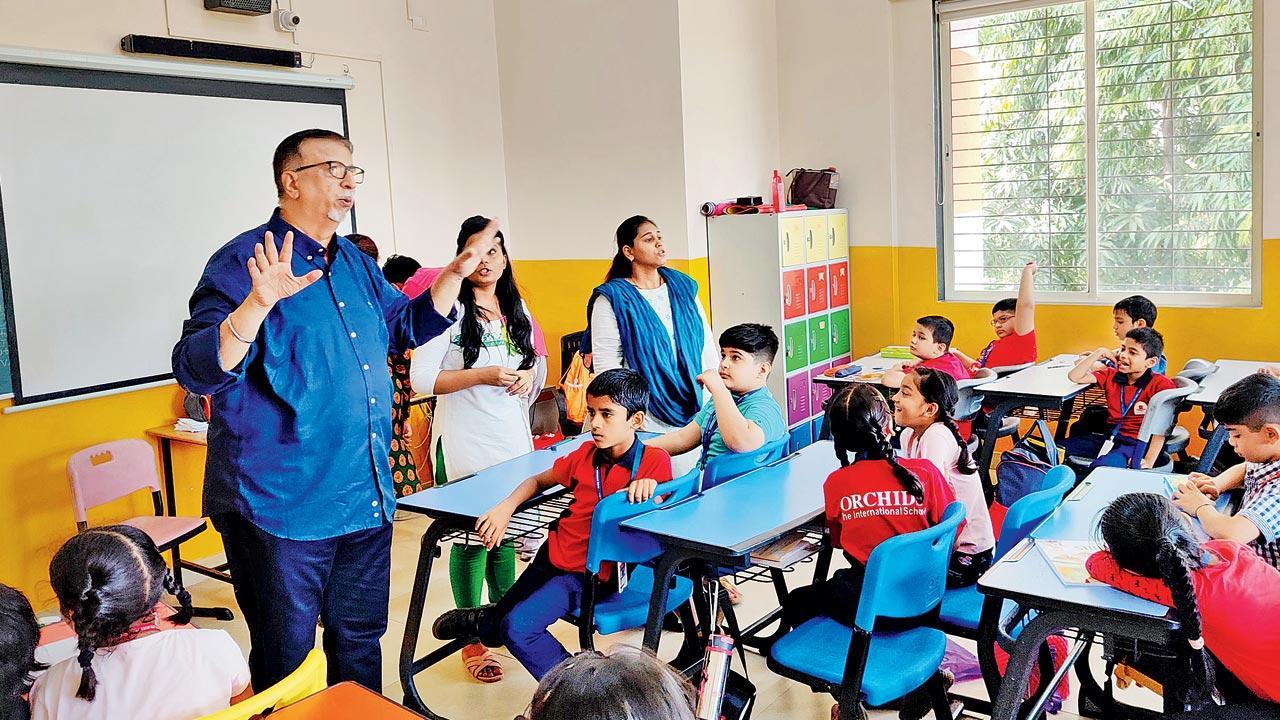In collaboration with Citizens Association for Child Rights, Orchids group of schools starts an initiative for students to collect plastic waste and recycle them, and understand sustainability

Nitin Wadhwani (in blue shirt), founder and director of Citizens Association for Child Rights, talks to students about plastic waste management, at Orchids The International School
"Practice what you preach,” Orchids The International School tells all of its students these days. The Orchids group of schools collaborated with the Citizens Association for Child Rights (CACR), a UNICEF development partner, to sensitise their students to the issue of plastic waste management and garbage segregation at source.
ADVERTISEMENT
As part of this initiative, students from Stds I to X are collecting plastic waste and wrappers from their homes and neighbourhoods, and putting them in a designated spot at their respective schools, where CACR volunteers pick them up every 15 days to send it for recycling.
CACR will transport and recycle the waste collected from the schools with the help of its Singapore-based partner Blue Planet Environmental Solution, a waste management company. The NGO plans to make usable products like benches, waste bins, and desks with recycled waste and provide it back to the school.
In the first phase, the programme has been launched in the group’s Kurla and Borivli schools. “With the vision of creating a garbage-free Mumbai, the school has initiated the programme from its Borivali and Kurla branches in the first phase,” said the spokesperson.
Also Read: Ensure single-use plastic ban by end of June: Centre
CACR is implementing a pilot project—Collective Drive Responsibility-Recycling—in Mumbai and neighbouring municipal corporations to demonstrate plastic waste management through segregation at source and recycling.
CACR conducted a sensitisation session with the students to explain the modes by which waste needs to be segregated. Upon completion of the project, the students will be rewarded with 2,000 points while the schools will be given a trophy for participation.
CACR has registered the schools as part of the programme and students participate through the Blue Nudge platform that is designed to help participants develop an understanding of sustainability. The curriculum provides a tailored approach and workflow to help both children begin their sustainable journey to inspire change within the community.
Among the topics covered in the programme are food waste reduction, green energy, water conservation, sustainability awareness, recycling, waste management, plastic consumption reduction, green transportation, sustainable diet, community leadership, and engagement.
Anand Ghodke, WASH (Water, Sanitation and Hygiene) Officer, UNICEF-Maharashtra, said, “The second phase of the Swachh Bharat Mission calls for garbage-free cities, which eventually means that all residential, commercial, and public places need to follow the basic principles of cleanliness.”
“Plastic in any form is not an environment friendly option. Given the climate change deliberations globally, plastic waste is considered one of the most dangerous attributions to the environmental crisis if not managed properly,” Ghodke added.
Elaborating on the initiative, Sarvamangala Koti Singhal, head of Public Relations, Orchids The International School, said, “Our children are the changemakers of tomorrow. So, it is imperative that they understand how our everyday activities can contribute to creating a bigger impact on the environment and avert the effects of climate change. Children are empowered to educate others around them also about sustainable practices and they act as responsible climate warriors at home and school. Hence this is the perfect time to make them aware of the toxic after-effects of our actions toward nature.”
2
No. of schools where the initiative has started
 Subscribe today by clicking the link and stay updated with the latest news!" Click here!
Subscribe today by clicking the link and stay updated with the latest news!" Click here!







